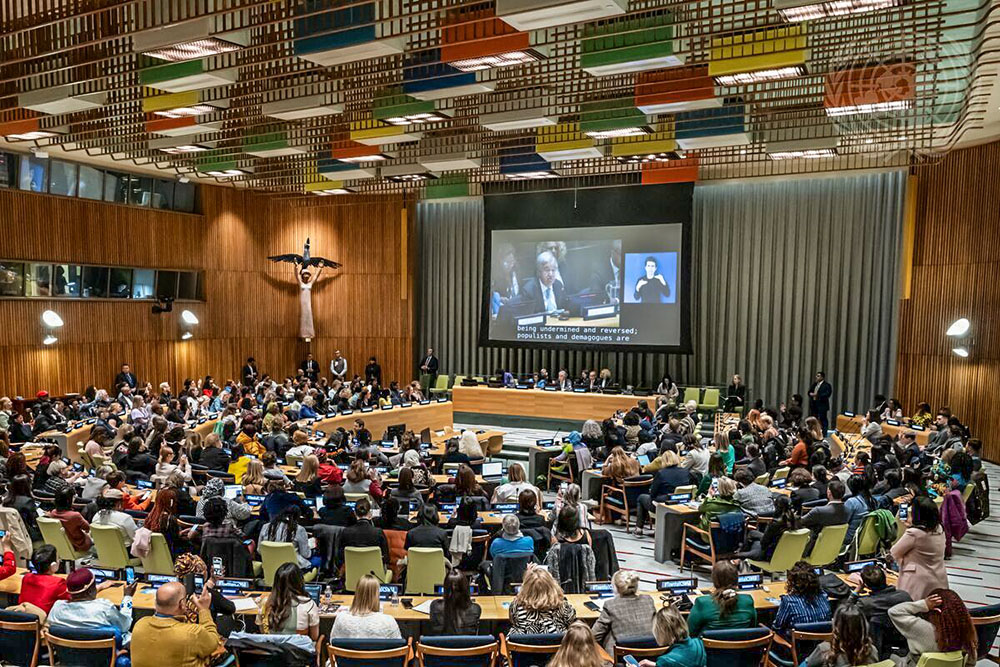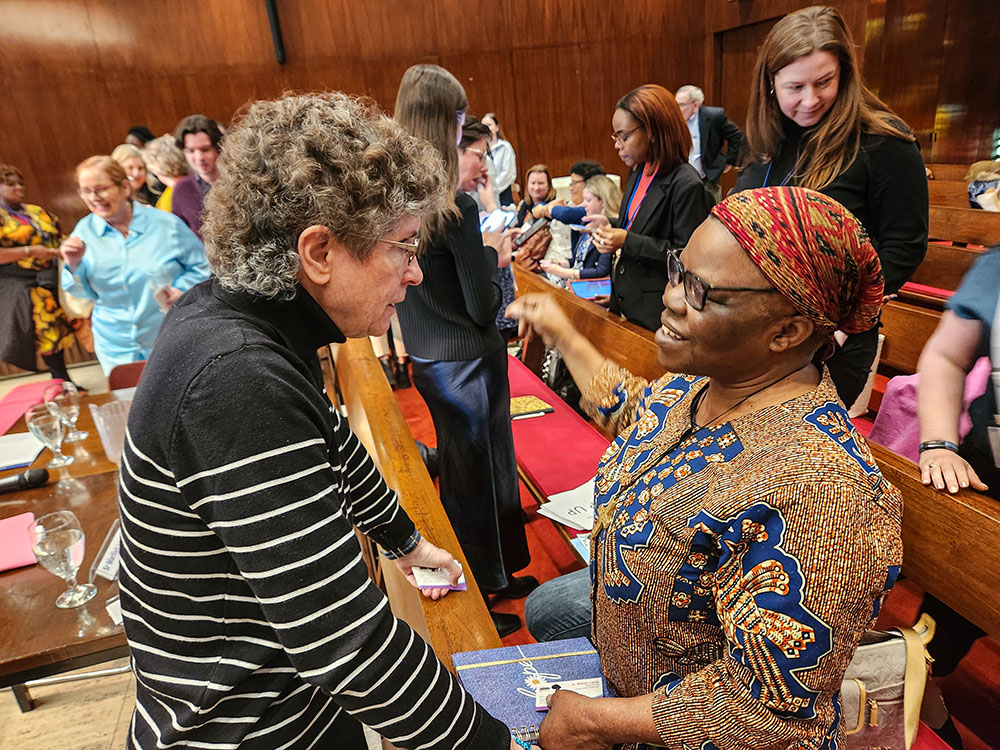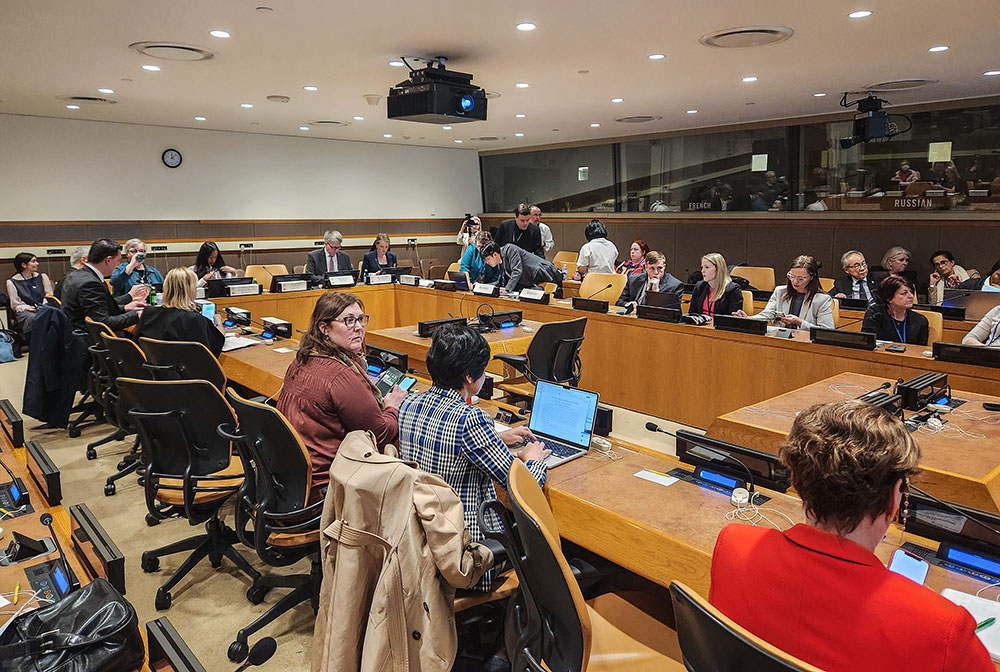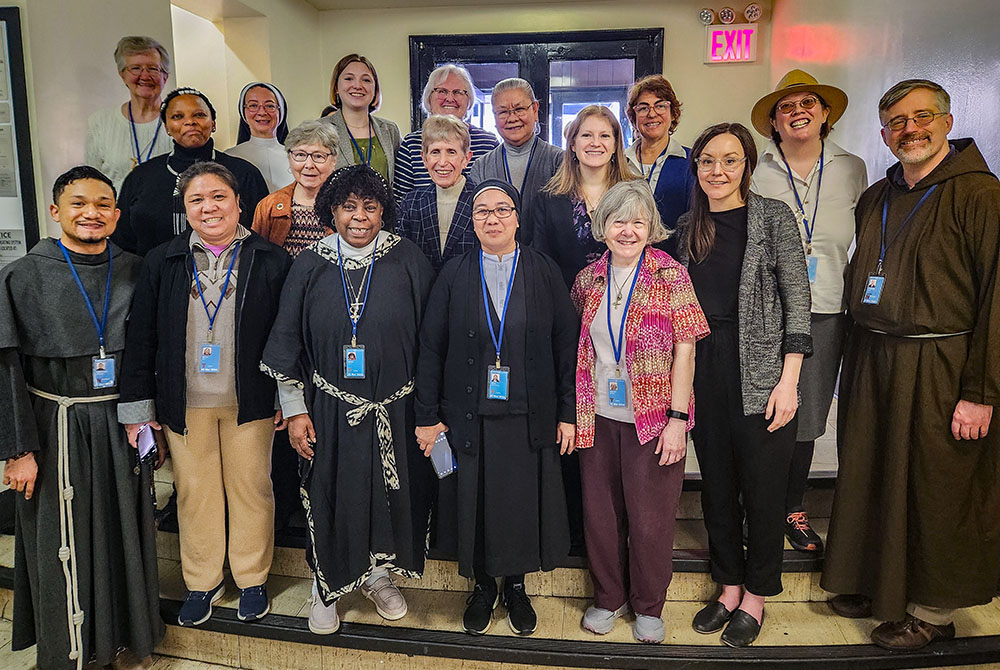
A wide view of a town hall meeting on March 13 with members of civil society during the 68th session of the Commission on the Status of Women at the United Nations in New York. On the screen is U.N. Secretary-General António Guterres. (U.N. photo/Mark Garten)
Two weeks of meetings, workshops and assemblies at one of the most prominent annual global gatherings of women — the United Nations Commission on the Status of Women — have affirmed the need for gender equality and female empowerment by eradicating poverty and strengthening access to financial institutions.
Dozens of Catholic sisters participated as leaders, participants or observers in the 68th gathering of the commission at the United Nations in New York, held March 11-22. This year's priority theme was "Accelerating the achievement of gender equality and the empowerment of all women and girls by addressing poverty and strengthening institutions and financing with a gender perspective."
A final document of conclusions was approved by consensus on Friday, March 22, though U.N.-based diplomats were scheduled to reconvene on Wednesday, March 27, to air disagreements on the document, centering on language some countries find problematic, such as issues regarding sexuality.
Such disagreements are not unusual, said veteran Commission on the Status of Women participant Good Shepherd Sr. Winifred Doherty, who represents the Congregation of Our Lady of Charity of the Good Shepherd and its partners-in-mission at the United Nations.
In a March 22 statement, UN Women, the United Nations organization focused on gender equality, said the outcome document "recognizes that women and girls living in poverty become 'shock absorbers' in times of crisis and that further efforts are needed to increase resources to address women's and girls' poverty."
The statement added: "Acknowledging that the international financial architecture is not fit for a crisis-prone world, the Commission called for reforms to enable countries to mobilize and invest resources in gender equality. These measures include debt relief and progressive taxation and ensuring that public resources are allocated to address the needs and rights of women and girls."
In a post-meeting interview with Global Sisters Report, Doherty praised the conclusions as a "good document" that "looks realistically at the issue of poverty and its debilitating effects on women and girls around the world and says we should do something and it should be done in health care, in education and gender equality structures."
It is the type of document, Doherty said, that leaders of U.N. member states can "take home and begin a national discussion around how can we address this — how can we eradicate poverty in our country looking at this document?"
Among the points the document raises are "the need for legal gender equality; access to health care, food, sanitation, water, electricity and to digital learning — all of these things that we speak about that would raise the quality of life for women and girls," Doherty told GSR.

During a March 15 event, "Financing with Dignity," at the Church Center of the United Nations, panelist Mercy Sr. Marilyn Lacey, left, founder and executive director of the international nonprofit Mercy Beyond Borders, speaks to Notre Dame de Namur Sr. Isabelle Izika, right, who represents her order at the U.N. (GSR photo/Chris Herlinger)
Among the set of agreed-upon conclusions in the 29-page document to "expand fiscal space and strengthen institutions towards supporting economic and societal transformations to end women's poverty, securing sustainable development by focusing on reducing systemic risks and structural inequalities, and urgently take comprehensive and targeted measures to address the root causes and challenges of poverty in all its forms and dimensions, including extreme poverty, hunger and all forms of malnutrition affecting women and girls in light of its negative impacts on sustainable development, through integrated, coordinated and coherent strategies at all levels."
Doherty said it is important for Catholic sisters to participate in Commission on the Status of Women events and to lead workshops that highlight sisters' work. Sisters' projects are often small-scale and don't get the attention of governments that they deserve, she said.
"We do excellent work on the ground and oftentimes innovative work, but we're not able to reach scale when they say to reach scale," Doherty said. "So, we're not able to get it 'up in the lines' so that when it comes to the attention of governments — that governments would want to say, 'We want this for all of our country.' "
In addition, Doherty said that, based on her 16-year mission experience in Ethiopia, such programs sometimes run up against government policies, and officials will even try to shut down such initiatives.
Yet sister-run or supported programs are important, said Beth Blissman, the Loretto Community's representative at the United Nations. She said that sisters' congregations are among those "that work with the people at the grassroots," and it is equally important for "all of the NGOs [nongovernmental organizations] all around the world who are busy empowering women, busy solving the challenge of women's poverty, supporting women's entrepreneurship right and left, to gather together."
"Many of these programs don't get funded the way they should be — certainly they are not on the mainstream radar in terms of funding either through the U.N. or many of the country governments," said Blissman.
She noted that the "global face of poverty" tends to be female, and "when disaster strikes, which is becoming more and more common, especially with the climate crisis, girls particularly are affected first and worst."
(The Loretto Community co-sponsored several online events at the Commission on the Status of Women gathering. The events can be accessed here and here.)
Blissman told GSR that a major U.N. summit — called the Summit for the Future, to be held in September — will examine these dynamics and ways that the global community can work more cooperatively on achieving the U.N.'s ambitious 17 sustainable development goals, or SDGs, to fight poverty and other daunting challenges.
Such challenges were on display throughout the commission gathering, with sister participation and leadership.
Advertisement
A March 14 event hosted by the Permanent Mission of the Holy See to the United Nations, the Republic of the Philippines and the Santa Marta Group — a church-founded anti-trafficking initiative — focused on the ongoing challenges of human trafficking and partnerships trying to end this troubling global problem.
Among the sister speakers were Maryknoll Sr. Abby Avelino, who heads the sister-led anti-trafficking ministry Talitha Kim International, and Mercy Sr. Deirdre Mullan, who is a trustee of the London-based anti-trafficking and anti-human-slavery organization Arise.
Mullan noted that more than 50 million people worldwide "are enslaved and exploited as human traffickers become more sophisticated and lure more and more people, including children and migrants, into the trappings of modern slavery."
The Catholic Church, Mullan said, "is increasingly on the frontlines in the battle against this phenomenon that is described by Pope Francis as 'an open wound in the side of humanity.' "
She said a cornerstone of the work of the Arise Foundation "is predominantly 'women to women': religious women supporting a variety of women and girls who find themselves in desperate, unimaginable situations."
Mullan praised partnerships, such as Arise's work with the Knights of Columbus in the Philippines, among others. Supporting frontline groups in the Philippines, she said, has helped promote anti-trafficking projects, which she said reached more than 6,000 people.
Among the projects — aimed at building the resilience of those vulnerable to trafficking — are education, employment and community mobilization.
Mullan praised the recent commitments of governments, like the Philippines, to "invest significant resources into prevention work, particularly the enforcement of the plethora of anti-trafficking legislation passed in recent years."
But Mullan added, "Financial investment in anti-trafficking work must match the massive financial resources of the criminal networks responsible for this heinous crime."

During the Commission on the Status of Women, a March 14 event at U.N. headquarters focused on the ongoing challenges of human trafficking. The event was hosted by the Permanent Mission of the Holy See to the United Nations, the Republic of the Philippines and the Santa Marta Group. (GSR photo/Chris Herlinger)
In her remarks, Avelino said it is imperative that those within the church continue to listen to the cry for hope by those who have been trafficked. She noted in particular situations in conflict zones where, especially for women, there are often not many options to survive.
The persistent and stubborn realities of conflict zones were heard throughout several commission events, including a March 19 online event focused on the ministries of Dominican sisters.
Adrian Dominican Sr. Durstyne (Dusty) Farnan, who represents the Dominican Leadership Conference at the United Nations and acted as moderator, said as many as 614 million women and girls live in conflict areas.
One country facing such challenges is the Central African nation of Cameroon. There, Sr. Linda Nkechi Korie and Sister Josepha, both members of the Dominican Sisters of Blessed Imelda, said their ministries are helping families face struggles with a sense of hope.
Sister Josepha's ministry, for example, in the northwest part of the country, is dealing with the fallout from conflict-related crises, including kidnappings; teenagers taking up arms; high crime rates and banditry; youths leaving the region out of fear and sense of discouragement for the future; and a lack of religious formation for youths.
Sister Josepha said since the start of ministries in the northwest Balikumbat region in October 2017, catechesis, counseling, coordination of youth activities at the parish level, the accompaniment of youths and families, and the founding of a domestic multipurpose center have created a sense of purpose and led to concrete changes in people's lives.
"We seek to empower the underprivileged youths by helping them to build their own capacity," she said.
That theme was taken up at another forum, "Financing with Dignity," held March 15 at the Church Center of the United Nations.
The event, sponsored by the Mercy International Association, focused on affirming "values-driven investment" to empower women and girls and achieve gender equality.
Though the discussion focused on the trends of congregations and other faith-based groups to align their investments with their faith values, it also focused on the need for ministries to promote financial independence for women.
"When women get cash, they have choices," said Mercy Sr. Marilyn Lacey, founder and executive director of the international nonprofit Mercy Beyond Borders, which works in Haiti, South Sudan, Uganda, Kenya and Malawi. "They have a voice for the first time. They have agency."

In an informal March 15 gathering, a group of Dominicans and St. Joseph sisters, as well as representatives of Franciscan networks, met during the Commission on the Status of Women. (GSR photo/Chris Herlinger)
A sense of women's empowerment undergirded the entire two weeks of the Commission on the Status of Women — something felt by visiting sisters at the U.N. event.
During an informal March 15 gathering organized by Farnan, a group of Dominicans and St. Joseph sisters, as well as representatives of Franciscan networks, told GSR that the commission is affirming in ways they didn't always expect.
Sr. Jolyn Dungo, an Adrian Dominican sister from the Philippines, said the sheer number of initiatives by and for women surprised her and that she had gained new insights into the many challenges women face globally. That and the fact that so many women are "advocating for policy changes to address gender inequality and work towards creating a more inclusive and gender-equal society on a global scale."
She said when she returns to the Philippines, there is much she can share with other sisters from her congregation and Indigenous persons in a new ministry on the southern island of Mindanao.
The Commission on the Status of Women, Dungo said, "invites us to continue to be passionate in giving hope and uplifting the situation of women in our own community and in our country and the women we live and work with."
"Let us be an instrument in making their lives worth fighting for."
"Going back home, I will feel empowered," said South African Dominican Sr. Valentine Dlada. "It feels empowering to be around women who speak up. It's an affirmation of our work."





